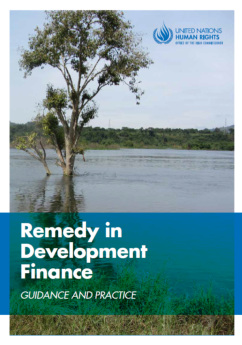Remedy in Development Finance: Guidance and Practice
Published
23 February 2022
Focus
Sustainable development
Bilateral and multilateral development finance institutions are critical actors in development and make important contributions to the Sustainable Development Goals as well as human rights. Nevertheless, development finance institution-supported investment projects are often associated with adverse impacts to communities and the environment. For many communities – even those that are able to access accountability mechanisms associated with DFIs – the goal of remedy remains elusive. Furthermore, against the backdrop of an entrenched global pandemic, growing inequality, shrinking civic space, and rising authoritarianism, remedy can be put even further out of reach. Remedy in Development Finance is the result of two years of research and consultations with development finance institutions, independent accountability mechanism, and civil society organizations across the globe. The publication helps to contextualize current policies and practices of development finance institutions on remedy, analyzes gaps and opportunities for improving access, and generally seeks to demystify and normalize the concept that is all too often associated with finger-pointing and blame-shifting. The analysis is grounded in the international human rights framework, and in particular the concepts of human rights due diligence and remedy under the United Nations Guiding Principles on Business and Human Rights. In addition to commenting on the state of play of remedy in development finance, the report also offers recommendations to policymakers and practitioners on how to strengthen the “remedy ecosystem.”

Issued By:
Office of the High Commissioner for Human Rights
ISBN:
978-92-1-154244-8
Print format:
A4 soft cover
Sales number:
E.22.XIV.7
Versions
English:
VIEW THIS PAGE IN: